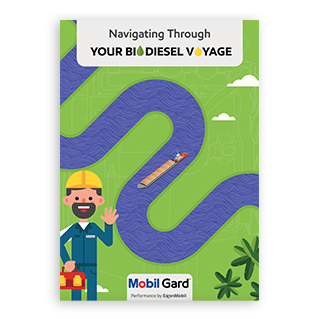

Charting a secure biodiesel voyage in South East Asia with ExxonMobil
Governments across South East Asia are increasingly mandating the use of biodiesel – a fuel blend that contains varying levels of bio-content; predominantly palm oil. The countries that have so far explored its use are:
- Indonesia, which currently mandates the use of a B30 formulation (30% bio-content). This will rise to B40 in July 2021.
- Malaysia, which has mandated the use of B20 from mid-June 2021.
- Thailand, which is currently planning to legislate the use of B20 for high-speed vessels.
Biodiesel provides a renewable energy resource and can increase energy security but it can also have adverse effects on your high speed diesel engine due to the increased risk of fuel diluting the engine oil. Also, the higher the bio-content, the greater the risk of contaminant build-up in the engine.
Biodiesel dilution can induce:
- Oxidation and degradation of the oil
- Piston deposits
- Soft metal corrosion of bearings and wear
- A loss of viscosity and interference with lubrication
- Degradation of low temperature properties of the oil
If left unchecked, biodiesel dilution can lead to component damage and eventually engine failure. It is therefore essential for vessel operators to select the best possible lubricant and monitor its in-service performance.
ExxonMobil has developed a guide that explains how vessel operators can minimise the adverse effects of biodiesel. Navigating Through Your Biodiesel Voyage contains helpful information on:
- Common problems associated with biodiesel in marine high speed engines
- The benefits of selecting biodiesel-compatible marine engine oils
- The operational advantages of used oil analysis and engine inspections
The document also provides insights into how vessel operators can enhance productivity by minimising avoidable downtime, improve operational safely and cut unnecessary expenditure.